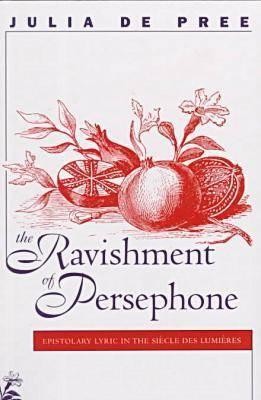
- We will send in 10–14 business days.
- Author: Julia De Pree
- Publisher: University of North Carolina at Chapel Hill Department of Romance Studies
- ISBN-10: 0807892629
- ISBN-13: 9780807892626
- Format: 15.1 x 23.2 x 1.3 cm, minkšti viršeliai
- Language: English
- SAVE -10% with code: EXTRA
Reviews
Description
This study delineates a theory of epistolary lyric that refutes historical notions of a siecle sans poesie. Julia De Pree argues that monophonic, epistolary texts written during the Ancien Regime both reflect and resist the Classical legacy and at the same time anticipate the nineteenth-century prose poem. De Pree illustrates her theory of epistolary lyric through readings in the historical canon (Montesquieu, Diderot, Rousseau, Laclos) but emphasizes the contributions of the epistoliere: Francoise de Graffigny, Isabelle de Charriere, and Marie-Jeanne Riccoboni. She argues that through their relatively short length, their incorporation of blank space, and their monophonic voice, female-authored letter-texts articulate epistolary lyric at the intersection of narrative, theatrical, and poetic codes. De Pree concludes that as a plural and protean form, epistolary lyric anticipates the so-called poetic revolution(s) that transformed nineteenth-century French lyric.
EXTRA 10 % discount with code: EXTRA
The promotion ends in 22d.18:19:48
The discount code is valid when purchasing from 10 €. Discounts do not stack.
- Author: Julia De Pree
- Publisher: University of North Carolina at Chapel Hill Department of Romance Studies
- ISBN-10: 0807892629
- ISBN-13: 9780807892626
- Format: 15.1 x 23.2 x 1.3 cm, minkšti viršeliai
- Language: English English
This study delineates a theory of epistolary lyric that refutes historical notions of a siecle sans poesie. Julia De Pree argues that monophonic, epistolary texts written during the Ancien Regime both reflect and resist the Classical legacy and at the same time anticipate the nineteenth-century prose poem. De Pree illustrates her theory of epistolary lyric through readings in the historical canon (Montesquieu, Diderot, Rousseau, Laclos) but emphasizes the contributions of the epistoliere: Francoise de Graffigny, Isabelle de Charriere, and Marie-Jeanne Riccoboni. She argues that through their relatively short length, their incorporation of blank space, and their monophonic voice, female-authored letter-texts articulate epistolary lyric at the intersection of narrative, theatrical, and poetic codes. De Pree concludes that as a plural and protean form, epistolary lyric anticipates the so-called poetic revolution(s) that transformed nineteenth-century French lyric.


Reviews